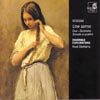Rossini (Une) larme
It’s Rossini, but not as we know him
View record and artist detailsRecord and Artist Details
Composer or Director: Gioachino Rossini
Genre:
Chamber
Label: Harmonia Mundi
Magazine Review Date: 10/2004
Media Format: CD or Download
Media Runtime: 64
Mastering:
Stereo
DDD
Catalogue Number: HMC90 1847

Tracks:
| Composition | Artist Credit |
|---|---|
| Serenata |
Gioachino Rossini, Composer
Ensemble Explorations Gioachino Rossini, Composer Roel Dieltiens, Cello |
| (6) Sonate a quattro, Movement: No. 6 in D |
Gioachino Rossini, Composer
Ensemble Explorations Gioachino Rossini, Composer Roel Dieltiens, Cello |
| Duet |
Gioachino Rossini, Composer
Ensemble Explorations Gioachino Rossini, Composer Roel Dieltiens, Cello |
| (6) Sonate a quattro, Movement: No. 3 in C |
Gioachino Rossini, Composer
Ensemble Explorations Gioachino Rossini, Composer Roel Dieltiens, Cello |
| Péchés de vieillesse, Book 9, '[Album pour piano, violon, violoncelle, harmonium et cor]', Movement: Une larme: thème variations, A minor: cello and piano |
Gioachino Rossini, Composer
Ensemble Explorations Gioachino Rossini, Composer Roel Dieltiens, Cello |
Author: Richard Osborne
Where aural devilry is concerned, Paganini or Berlioz come to mind ahead of Rossini. No longer. This sonically challenging collection will have musically minded ornithologists reclassifying the Swan of Pesaro as the Raven. Rossini may not have approved. He loved beauty and was no necromancer, as his persistently light-filled setting of Armida proves. That said, his soundworld has long been a source of fascination to the moderns. Roel Dieltiens and his period-instrument group don’t remake the scoring à la Stravinsky or Britten, but they do recreate it in new and fantastic ways.
On paper, this is a follow-up to the ensemble’s recording of four of Rossini’s six Sonate a Quattro (Harmonia Mundi, 11/02). Those performances were so leisurely there was no chance of fitting all six sonatas on one disc. They were also extremely odd: the music articulated in a manner more apt to angst-ridden late Schubert than pre-teens Rossini. Unrecommendable on its own, the earlier disc has bequeathed to this one the remaining string sonatas – Nos 3 and 6 – which Dieltiens and his group needed to make up what is a fascinating programme in its own right.
The two sonatas get much the same treatment as before. The buffo finale of No 3 is taken so slowly that it ends up sounding pretentious. However, the storm-tossed finale of the last sonata is a revelation. Period instruments are tremendously good at suggesting mayhem, especially when played as bracingly as they are here and recorded with such spellbinding accuracy.
The Duetto, which Rossini wrote in London in 1824 for amateur cellist David Salomons and the great double-bass player Domenico Dragonetti, emerges more than ever as a conversation between two grumpy old men. But again it is the sounds that fascinate. As they do in Rossini’s late theme and variations for cello and piano, Une larme. Dieltiens misses no opportunity to make his cello ‘speak’ with an almost exaggerated point and eloquence, to which Jan Vermeulen’s exquisite-sounding 1865 Erard makes its own distinctive contribution.
The 1823 Serenata, a one-movement septet for flute, oboe, cor anglais and string quartet, adds to the disc’s beguiling sense of sonic strangeness.
On paper, this is a follow-up to the ensemble’s recording of four of Rossini’s six Sonate a Quattro (Harmonia Mundi, 11/02). Those performances were so leisurely there was no chance of fitting all six sonatas on one disc. They were also extremely odd: the music articulated in a manner more apt to angst-ridden late Schubert than pre-teens Rossini. Unrecommendable on its own, the earlier disc has bequeathed to this one the remaining string sonatas – Nos 3 and 6 – which Dieltiens and his group needed to make up what is a fascinating programme in its own right.
The two sonatas get much the same treatment as before. The buffo finale of No 3 is taken so slowly that it ends up sounding pretentious. However, the storm-tossed finale of the last sonata is a revelation. Period instruments are tremendously good at suggesting mayhem, especially when played as bracingly as they are here and recorded with such spellbinding accuracy.
The Duetto, which Rossini wrote in London in 1824 for amateur cellist David Salomons and the great double-bass player Domenico Dragonetti, emerges more than ever as a conversation between two grumpy old men. But again it is the sounds that fascinate. As they do in Rossini’s late theme and variations for cello and piano, Une larme. Dieltiens misses no opportunity to make his cello ‘speak’ with an almost exaggerated point and eloquence, to which Jan Vermeulen’s exquisite-sounding 1865 Erard makes its own distinctive contribution.
The 1823 Serenata, a one-movement septet for flute, oboe, cor anglais and string quartet, adds to the disc’s beguiling sense of sonic strangeness.
Discover the world's largest classical music catalogue with Presto Music.

Gramophone Digital Club
- Digital Edition
- Digital Archive
- Reviews Database
- Full website access
From £8.75 / month
Subscribe
Gramophone Full Club
- Print Edition
- Digital Edition
- Digital Archive
- Reviews Database
- Full website access
From £11.00 / month
Subscribe
If you are a library, university or other organisation that would be interested in an institutional subscription to Gramophone please click here for further information.




